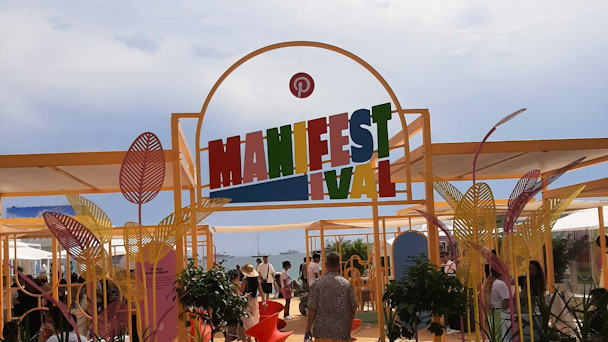Pinterest’s big pitch to advertisers is a call for a safer, kid-friendly internet
The e-commerce and image-sharing platform has unveiled a manifesto at Cannes for a more positive web.

The Cannes Lions pop-up. Pinterest has launched a ‘manifesto for a more positive’ web
Pinterest is making its biggest-ever push for the hearts and minds of users (and advertisers) with a bold new manifesto committing it to become the most positive corner of the internet, announced on the main stage at Cannes Lions today (Tuesday, June 20).
Speaking before the launch to The Drum, an excited Milka Privodanova, newly promoted to vice president and head of EMEA in Pinterest, teased: “We have to engineer the internet to be a more positive space. Nine out of 10 of our users agree we are an ‘online oasis’.”
We’re talking at Pinterest’s Cannes Lion pop-up, created by Amplify, the Manifestival (pictured) which was dripping with positivity and ink (on account of the free tattoos it was offering). It comes at a time when adjacent businesses in tech are clashing with their users, be it the Reddit blackout, Twitch’s clashes with creators over monetization and whatever has happened to platform health on Twitter.
Advertisement
Privodanova explains: “In the early days of social media the was the promise of something really, really positive and then we ended up here.”
Pinterest has always been on the periphery of the social media boom. Its status has been that of a visual catalog a few hundred million people return to regularly, it says, with an intent to make things (and more often than not, buy things). Certain retailers are excited by its mix of curation, AI distribution and shopability, it is finding its place in the retail media boom, most recently partnering with supermarket Tesco.
Positivity is key to this. “Pinterest is a place where people go to be with themselves. They don’t come here to debate the news of the day, they come to imagine a better life. We want people to create a life they love. The content is really not so much about ‘here’s what happened today.”
That brings us to the new framework that it has put in place with the Digital Wellness Lab at Boston Children’s Hospital. It is calling for tech companies to make the internet healthier for kids.
Advertisement
As a mother of two young children, Privodanova has had a hand in trying to create a safe experience online. The framework feeds into some of the network’s industry-leading ad policies; from bans around climate misinformation (yes even Pinterest had to deal with that), to divisive political ads, and more recently weight loss ads, something Privodanova cared about particularly.
The platform cites research from the US surgeon general, who recently issued a public advisory warning that “social media can also have a profound risk of harm to the mental health and well-being of children and adolescents.” That led to the launch of the Inspired Internet Pledge at Cannes Lions.
As it taps into the inspirational and aspirational pulls glossy lifestyle mags once excelled at, Pinterest is positioning itself to ride the retail media boom and be the place brands go to understand consumer behavior.
While positivity is a noble goal (that might appeal to a certain type of advertiser), the team at Pinterest is arguing that by creating a nice place to be, one that promotes a positive mindset, more commerce will take place. The argument mimics ideas long established in retail architecture and design.
Suggested newsletters for you
The framework explains how tech can take “meaningful, measurable actions to support positive mental and emotional wellbeing outcomes both on and offline.”
Post-pandemic, it’s becoming apparent that locked-down teens are still experiencing a mental health crisis. Some links have been drawn with social media. The Centers for Disease Control and Prevention (CDC), claims youth mental health has continued to worsen. Nearly three in five US teen girls felt persistently sad or hopeless in 2021, the highest level in a decade.
The Inspired Internet Pledge provides a framework for companies to take “meaningful, measurable actions” to support positive mental and emotional well-being outcomes - both on and offline. It also seeks to make signatories accountable, having to show evidence they are looking to approve.
The call to action urges signatories to:
-
Understand which actions and content correlate with well-being outcomes to inform how to build and evolve products and services that support healthier experiences.
-
Listen to and act on insights from people who have experienced harm online and the experts who support these communities, to inform the evolution of the policies and products.
-
Share lessons, creative solutions, and best practices collaboratively across the industry.
Signatories will create additional addenda to the pledge that describes the specific actions they will take to implement the pledge principles.
It’s no surprise that the app has issued this distinctive call to action on the ground at Cannes Lions, surrounded by the world’s most important marketers, some of whom may be rethinking the spread of their media spend across big tech.

